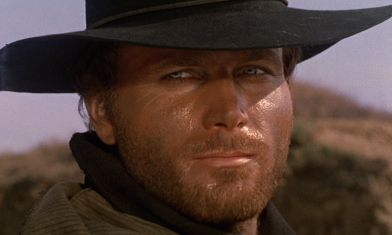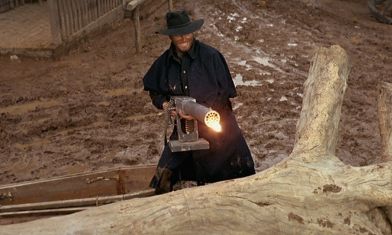« A few words about Carl Dreyer | Main | Coffee Break »
September 07, 2007
Django

Sergio Corbucci - 1966
Blue Underground Region 1 DVD
With The Great Silence as one of the 122 favorite foreign language films, this may signal a deeper look into the films of Sergio Corbucci. For many film scholars, Corbucci has been overlooked, his westerns in the shadows of that more famous Sergio. One of the the interesting little facts presented in the supplements to Django is that Corbucci actually filmed the first spaghetti western, beating his friend and rival Leone by several months.
Django should be mandatory viewing for those who love to gush about Quentin Tarantino. This is the film with the ear cutting scene that inspired the most notorious moment in Reservoir Dogs. Corbucci's film was considered too violent by some and never received a U.S. theatrical release. In the interview about the making of Django, the assistant director of that film, Ruggero Deodato mentions that Corbucci was himself inspired by samurai films. One can easily identify a narrative that is a variation of Yojimbo, itself the reworking of Dashiell Hammett's Red Harvest.

What makes Django still interesting to watch is the ways in which Corbucci upends various conventions from more traditional westerns. The virtual ghost town where much of the action takes place is the muddiest location I can recall. No one can pass through town without being caked with dirt. Inside the combination bar and hotel, the place is so cold that it takes little effort to see the breath of the actors. The town’s prostitutes are not the most attractive of women, and one sports a faint mustache. When the bartender joins in to play his violin with one of the piano playing girls, amateur gusto replaces any semblance of musicianship. Corbucci's west is not the land of promise or of new futures, but the broke down end of the line for people who have nowhere else to go.
While Franco Nero bears some resemblance to Clint Eastwood, his character of Django is a chatterbox in comparison to the man with no name. Django also has room for sexual liaisons, coupling with Maria, the woman he saves from the two rival groups at the beginning of the film. While Leone's hero is almost all business, Corbucci's hero selectively displays his vulnerability.
While not as developed as in other films, Django shares Corbucci's interest in using the western as a political parable. The chief villain, a former Confederate officer named Jackson hopes to carve out a new Dixie for himself in the small, unnamed border town. Leading a band of red hooded gunmen, Jackson shoots Mexican peasants for sport. His rival is the leader of a group of Mexican rebels, more interested in plunder than in any real political change. Power is seen as both a corrupting influence and something transient for those who are not part of the political establishment. For Corbucci, the best his heroes can hope for is a small moral victory.

Posted by Peter Nellhaus at September 7, 2007 10:12 AM
